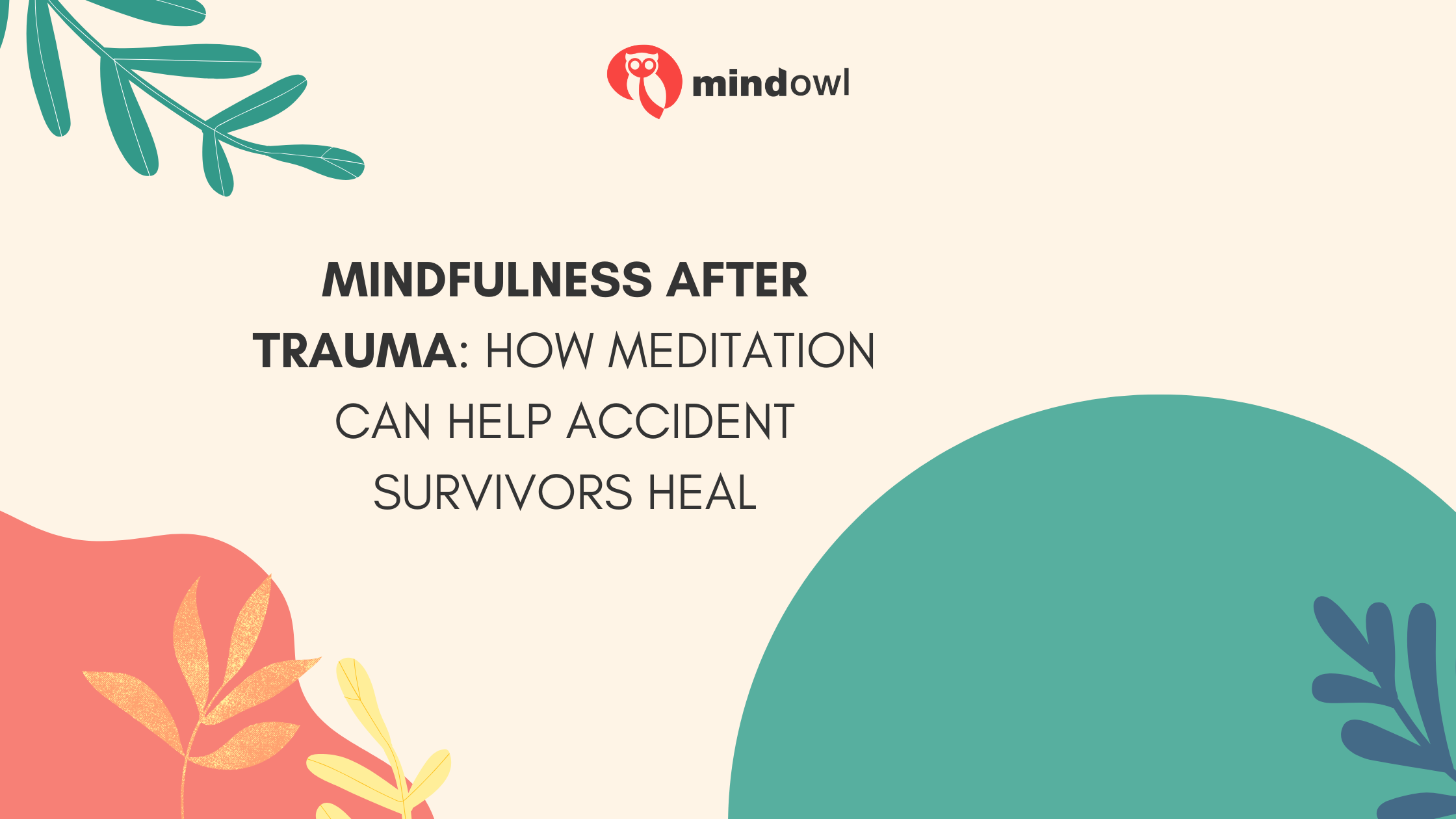Surviving an accident creates lasting emotional wounds that persist even after physical injuries have healed.
WHO notes that every year, around 1.19 million people lose their lives due to road traffic crashes. Between 20 and 50 million people suffer non-fatal injuries that significantly impact their daily lives and mobility. Many injured individuals develop long-term disabilities that require ongoing medical care, rehab, and financial support.
The overwhelming shock, fear, and anxiety make recovery feel difficult and uncertain for many accident survivors. Mindfulness meditation offers a powerful tool to regain emotional balance and create a sense of peace. Practicing mindfulness allows survivors to reduce stress, manage pain, and rebuild a sense of emotional safety.
This practice doesn’t erase trauma but encourages survivors to process emotions in healthier, more effective ways. In this article, we’ll explore mindfulness techniques that help with healing and how survivors can integrate them into daily routines.

Reconnecting with Your Body and Breath
Accident survivors often feel disconnected from their bodies, experiencing heightened sensitivity or numbness in certain areas. Mindfulness meditation helps rebuild this connection through specific techniques, including:
- Intentional breathing exercises that promote relaxation and awareness of physical sensations.
- Body scanning practices that help identify tension and areas of discomfort.
- Gentle movement techniques that encourage a stronger mind-body connection.
These mindfulness methods support healing by increasing awareness and fostering a sense of control over the body.
Verywell Mind states that research shows mindfulness practices can strengthen the immune system and improve the body’s resistance to illness. A study comparing mindfulness and exercise found an eight-week mindfulness course led to greater immune gains.
Participants practicing mindfulness experienced stronger immune function improvements than those who only engaged in physical exercise.
Deep breathing exercises allow survivors to regain control over physical sensations and promote emotional relaxation. A useful technique involves inhaling deeply, holding briefly, and exhaling slowly to reduce bodily tension.
Body scan meditation helps survivors reconnect with their bodies and become aware of physical sensations. Sitting comfortably, individuals mentally scan their bodies, acknowledging different sensations without judgment or resistance.
How does mindfulness impact digestion?
Mindfulness helps regulate digestion by reducing stress, which often disrupts gut function. Deep breathing activates the parasympathetic nervous system, aiding nutrient absorption and preventing bloating. Eating mindfully also improves digestion by encouraging slower, more intentional eating habits, reducing digestive discomfort, and promoting overall gut health.
Managing Emotional Triggers with Mindfulness
Emotional triggers from an accident appear unexpectedly, linked to locations, sounds, smells, or specific memories.
The Cleveland Clinic mentions that emotional triggers cause intense negative reactions and vary based on personal experiences, memories, and associations. Sensory, environmental, interpersonal, and cognitive triggers influence emotional responses, sometimes leading to anxiety and stress. Certain smells, criticisms, or past traumas can instantly activate deep emotional distress in affected individuals.
Mindfulness meditation helps survivors recognize and process these reactions without becoming overwhelmed or emotionally distressed. Avoiding triggers is not always possible, but mindfulness encourages individuals to approach them with compassion.
Grounding exercises, such as focusing on physical sensations, shift attention from distressing memories to present reality. Holding a textured object or feeling their feet on the ground helps survivors remain connected to the present.
Observing thoughts without immediate reaction allows individuals to recognize patterns and reduce emotional intensity. Mindfulness does not eliminate trauma but helps survivors develop healthier emotional responses over time.
Can mindfulness help with social anxiety after trauma?
Yes, mindfulness reduces social anxiety by increasing self-awareness and emotional regulation. It encourages survivors to stay present, preventing overanalysis of past or future interactions. Survivors can feel more confident engaging with others by focusing on breathing and bodily sensations in social settings.
Handling Post-Accident Challenges with a Clear Mind
Recovering from an accident requires handling legal and financial decisions that often create overwhelming stress for survivors. Medical bills, insurance claims, and settlement negotiations add challenges that make recovery feel even more complicated and emotionally draining.
Mindfulness helps accident survivors remain calm, stay present, and make informed choices without feeling completely overwhelmed or anxious. Speak with an attorney as they can provide crucial guidance, ensuring accident survivors understand their rights and receive fair financial compensation.
According to Freeman Law Firm, lawyers assist with gathering evidence, filing claims, and negotiating settlements that support a victim’s full recovery. Without proper legal representation, survivors may struggle to secure compensation for medical expenses, lost wages, and necessary treatments. Attorneys also protect survivors from unfair insurance tactics that could delay or reduce rightful compensation amounts.
Can mindfulness make medical treatments feel less overwhelming?
Yes, mindfulness helps survivors manage medical stress by promoting relaxation and emotional control. Focusing on breath and bodily sensations during procedures reduces fear and discomfort. Survivors experience treatments with less anxiety and greater emotional resilience by staying present rather than anticipating pain or side effects.
The Role of Support in the Healing Process
Recovering from trauma requires support, combining mindfulness with guidance from loved ones and mental health professionals. External support provides reassurance, comfort, and direction throughout the emotional recovery process after an accident. Participating in guided meditation sessions or mindfulness-based support groups helps survivors connect with understanding individuals.
These settings allow survivors to share experiences, reducing feelings of isolation and emotional distress. Support groups frequently incorporate mindfulness-based stress reduction (MBSR) techniques, combining meditation and therapeutic strategies for healing.
MedicalNewsToday highlights that MBSR includes breathing exercises like diaphragmatic breathing, which slows the heartbeat and lowers blood pressure. Meditation techniques, such as body scan meditation, help individuals relax by focusing on different body areas systematically.
Yoga and group dialogue sessions encourage mindfulness through movement, breath coordination, and shared personal experiences in MBSR.
Working with mindfulness instructors ensures practices are tailored to individual needs and emotional challenges. Developing mindfulness routines within a supportive environment fosters healing and encourages long-term emotional resilience. Strengthening connections with others enhances mindfulness benefits and creates a balanced approach to recovery.
How does mindfulness strengthen emotional resilience?
Mindfulness helps survivors process emotions without becoming overwhelmed. They learn to manage stress and setbacks more effectively by observing feelings without judgment. This builds emotional resilience, making it easier to cope with future challenges and maintain a sense of stability and inner strength throughout recovery.
Mindfulness is a powerful tool for healing after an accident, helping survivors regain control. It reconnects them with their bodies, eases emotional overwhelm, and brings clarity to the recovery process. Breathwork, body scans, and mindful observation build resilience and promote emotional well-being.
While it doesn’t erase trauma, it helps individuals create a healthier future. Mindfulness fosters self-awareness, reducing stress and enhancing mental strength during recovery. Combining mindfulness with professional support ensures a well-rounded healing approach. Legal guidance also plays a role in addressing post-accident challenges effectively.
MindOwl Founder – My own struggles in life have led me to this path of understanding the human condition. I graduated with a bachelor’s degree in philosophy before completing a master’s degree in psychology at Regent’s University London. I then completed a postgraduate diploma in philosophical counselling before being trained in ACT (Acceptance and commitment therapy).
I’ve spent the last eight years studying the encounter of meditative practices with modern psychology.

